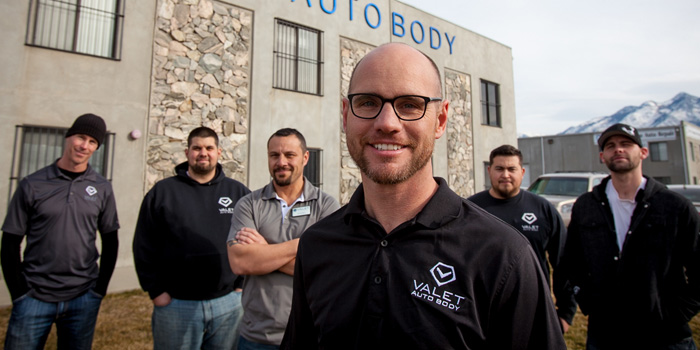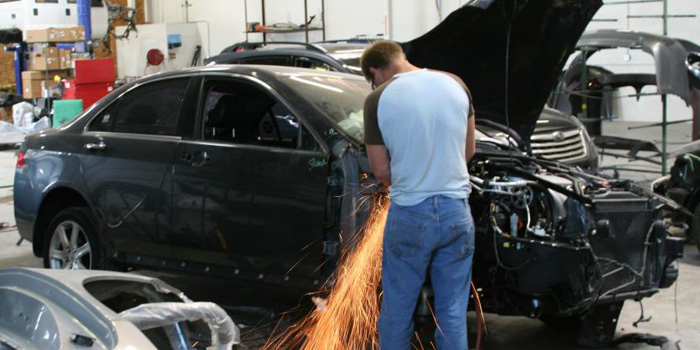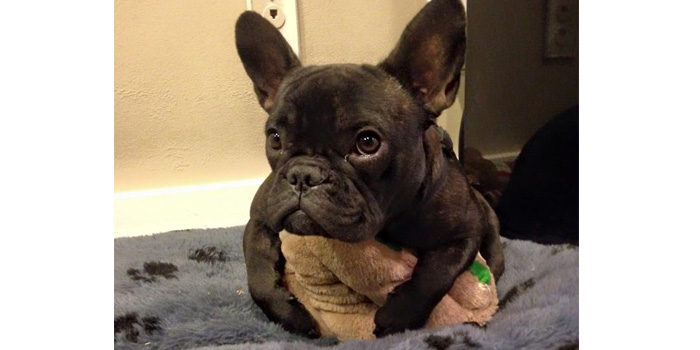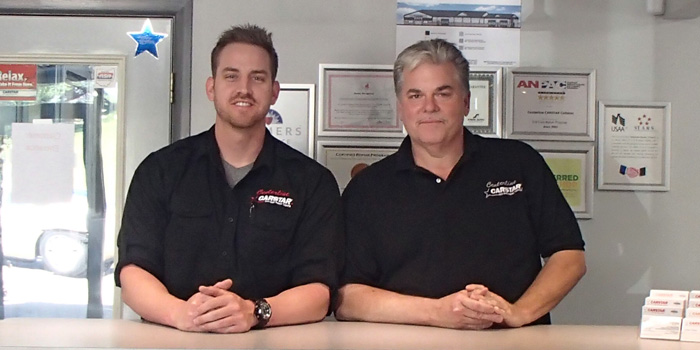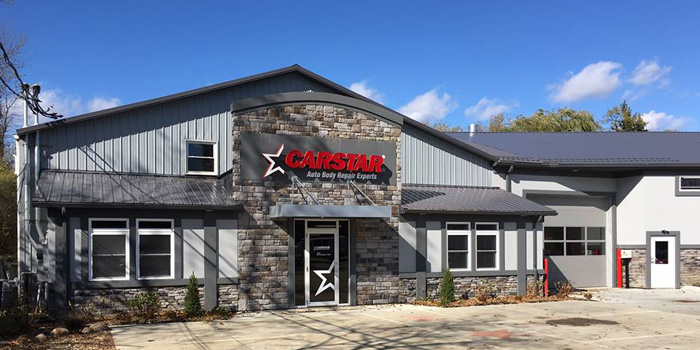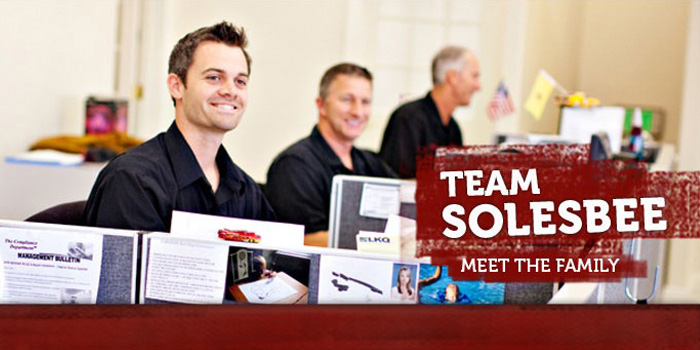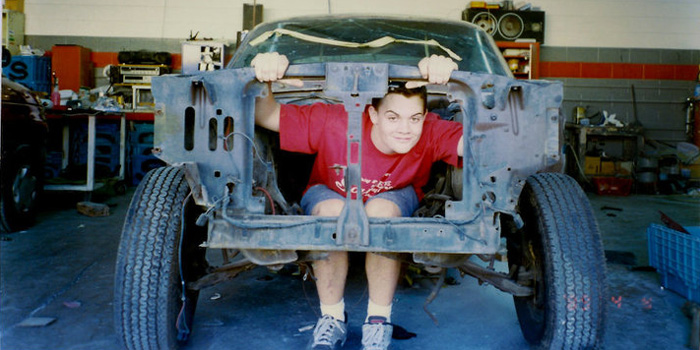No matter what industry you’re in, it’s a feat to be thriving under the age of 40. In the auto body industry, there’s the added obstacle of overcoming age-old ways of thinking and hardened minds and methods.
But a new class is growing, one that wants to alter the perspective customers have of collision repair facilities. One that is breaking the mold of what they, as an industry, have done and creating a new mold of what they CAN do.
The Freshman, Age: 39
Trace Coccimiglio isn’t your average body shop owner. He actually had never stepped foot in an auto body shop before he owned Valet Auto Body in Draper, Utah.
Trace earned his bachelor’s degree from the University of Utah, where he majored in economics.
“Surprising,” he said. “Thinking as an economist has helped me as I have tried to navigate the disconnect between what insurance companies want to pay for a repair and the quality repair customers expect.”
Trace and his team started from scratch by buying a couple buildings, installing equipment, remodeling old offices and throwing up a sign. And then, he explains, they just tried to “pretend” they were a “real body shop.”
“When we opened our doors in 2009, we purchased an 18,000-square-foot building, acquired a huge mortgage, employee payroll, property taxes, utilities, etc. Oh, and we had no customers.
“Anybody that happened to wander in the door represented my success. This was a matter of life or death for me.
“Luckily for me, I realized early on that being successful as an auto body shop can be just as much about fixing people’s lives as it is about fixing cars. After all, the car doesn’t choose the shop, the customer does. If we do amazing work on the car, but we ignore the customer, we won’t see either one ever again.”
Trace explained that it’s only in retrospect that he’s realized some of his standards at his shop may be considered innovative to some.
“We try to stay on top of the ever-changing vehicles and technology, but it’s in the front of the shop where we do things differently.
“My approach is certainly not always about the numbers, or even profitability. If I make every effort possible to put my customer first, there will always be room for me, too.”
When someone walks through the doors of Valet Auto Body, they aren’t bombarded with questions like “How can I help you?” or “Is this going through insurance?” Trace explains that the staff simply says, “Hi, how you are doing?” and lets the customer tell them.
“By just smiling and saying hello, we offer our customers a different experience than they get elsewhere,” he said. “I joke with customers that they probably aren’t very happy to see us, but we are glad they’re here. We begin to lay down a framework of trust and openness. We demonstrate that we are trustworthy…a rare trait among automotive companies.
“I don’t say, ‘You can trust me.’ Instead, I try to demonstrate it. If I demonstrate that someone can trust me, they will often come to that conclusion on their own. It’s human nature to trust your gut. We generally feel good about decisions we make on our own, without somebody overtly putting something in front of us. The key word there is ‘feel.’ Many of us claim to make decisions based on empirical data and objective facts, but we almost always make decisions based on how we ‘feel.’”
Trace explained that “selling” doesn’t need to be uncomfortable or pushy. To him, selling means helping others to appreciate the benefits of something good.
“If I believe in something, then selling is just a matter of having a conversation with a person,” he said. “During the conversation, I am asking open-ended questions and listening to the answers. During the conversation, I am sharing intelligent, reasonable ideas about how to help this person solve their problem.
“These things evolved from me not knowing any different. They evolved out of necessity. I didn’t know what I was ‘supposed to do,’ so I just did what came natural to me: I treated my customers the way I would want to be treated.”
One of Valet’s best employees is great at putting customers at ease. Her name is Lucy and she is 2 years old and is French…a French Bulldog, that is.
“She comes to work with us everyday,” said Trace. “She is our No. 1 salesperson. She even responds to being paged over the intercom system. If she is upstairs and someone pages, ‘Lucy, come say hi,’ she will run downstairs to meet her visitors.”
While it’s easy to get Lucy’s love, how exactly did Trace earn respect from his fellow employees? Well, to start, he never demanded it. “I try to consistently show respect to my staff, then, eventually lasting respect is given back. Most people will give respect to those who show it to them.
“Lasting respect is earned over time. I don’t claim to be an expert at this, and I need to work to improve as a leader, but I do try to show appreciation for the efforts of my peers.”
Trace never had the advantage of knowing the so-called “old guard” in the auto body repair industry, but his guiding principle has always been to live by the “golden rule.”
“It’s not just a phrase I use because we’re all familiar with it. In fact, I think it’s kind of outdated and old fashioned,” he said. “I always try to do what I would expect if I were the customer: Treat them the way I would like to be treated. If my team and I do this, then we are almost guaranteed to have a happy customer.”
The Heir, Age: 29
Paul Struhar Jr., the general manager of Centerline CARSTAR Collision Center in Strongsville, Ohio, grew up in the auto body business. Really, it’s all he’s ever known.
“My father [Paul Sr.] was able to provide us with a great life,” he said. “It’s a good living basically if you run it right.”
Paul Jr. has never had an issue earning respect from his fellow employees because he never wanted to be looked at as “the boss’s son.”
“I just work hard and respect my technicians and employees because you need to respect them to earn respect. I’ve worked my way up from the bottom. When I started, I was sweeping floors and washing cars.
“[Paul] Sr. has put me through all the shop steps. It wasn’t just, ‘Here you go, this is my son and he has special rights.’ He yelled at me just as much as he yelled at them,’” chuckled Paul Jr.
His strongest skills stem from management. In fact, Paul Jr.’s favorite part of the job is managing all of his employees and knowing how each one of them ticks. He explains how he has to approach and treat each employee differently in order to motivate them to be better.
“That’s probably one thing I bring to the table that [Paul] Sr. really didn’t,” he said. “I’m a little more bendable and understanding to how the techs want to do things.”
Growing up in the business helped Paul Jr. truly learn every job in the shop, from writing estimates to fixing cars. He has a drive that’s quite rare in the industry today.
“You have got to be driven if you want to own a collision shop these days. You have to have that drive to want to better your company.”
Paul Jr. doesn’t think his big-picture viewpoint differs all that much from those who came before him: to take care of the customer and produce a high-quality job.
“It changes in the sense that, with these insurance companies measuring our cycle time and every little thing we do, we have to be that much more efficient.
“Back in the day, if the back lot was full and the shop was full, you were doing good,” explains Paul Jr. “But nowadays, you can’t do that because you have to know what you can produce as a shop and what kind of numbers you can put out and then you need to schedule accordingly so you can work on everything that’s there.”
When it comes to populating the shop with the next generation of workers, Paul Jr., Senior and the whole team have a great plan currently in place.
“Senior sits on a couple of the different vocational school boards, so we usually get first pick of the best students out there,” he said. “I actually have one down here now. He’s a senior in high school still and he gets out of school around 2 p.m., comes straight here and works with my disassembly and reassembly program in the back. It’s a good starting point for them. I have a couple of techs that have been here 12-15 years and we’ve gotten them right out of vocational schools.
“We’re definitely big into vocational schools and bringing in young talent and molding them into our shop and how we do things,” said Paul Jr. “Sometimes when you hire the older guys, they’re so set in their ways that it’s hard to get them to change and conform to the new way of thinking.”
Paul Jr. has a couple tips in his back pocket for staying ahead of the curve going forward.
“We’ve always got to be up to date on the latest and greatest, and continual improvement, being able to change with the times,” he said. “You have to stay on top of your game, keep your employees trained, and invest time and money into your facility. Some of these shops are stuck in the old way of doing things and that’s not going to fly too much longer.”
The Strategist, Age: 35
Greg Solesbee, the current operations manager at Solesbee Auto Crafts in Yorba Linda, Calif., is in an interesting place in his career right now. He realizes that in order to compete in today’s market, you have to have two things: A process that works and continued growth. This has put him in the position of asking himself whether he can build the current brand or does he need to break out on his own?
Greg is the youngest of seven children. By default, he said, that should have made him the laziest out of everybody. With a 21-year difference between the oldest child and himself, they grew up in completely different worlds. But laziness is just not Greg.
“I grew up in this shop. I’ve been working here since I was 12,” he said. “I worked my way up through nearly every position (for a time) in the business to where I am now. I love body work, painting and estimating. I have a Mustang on a rotisserie in my garage at home that I’m restoring. Looking back, I felt that I had heard other employees’ complaints, and most of the time it had to do with process. I had no control over the process in these other positions and could see that I was stuck waiting for everyone else to correct things that I heard and saw needed correcting.
“Talking to my dad about [our] history, I asked, ‘What did your dad have?’
“Not much,” he said.
“Well, what did his dad have?”
“Oh geez, even less.”
“So if your dad wanted to succeed or wanted any type of fun living, how did he get it?”
“Well, he had to work for it.”
“And if he didn’t have to work for it or maybe his business didn’t work, then what would happen?”
“Well shoot, they’d be out on the street.”
“Well, what did your dad give you?”
“Nothing.”
Greg’s parents started out with nearly nothing. In fact, the four oldest children named themselves the ‘Poor Four!’” But his parents worked their way up and broke the system: they succeeded. They could provide for their kids what they had not.
“The problem is, though, when you do that, there’s an element that’s missing, [an element] of doing it on your own, actually going out and succeeding,” said Greg. “When you’re out there making it on your own, you feel it. It does something to your soul.”
And Greg is feeling the urge to either take this business to the next level or break out on his own, with some real skill and edge to succeed.
The first thing Greg says you need to decide is do you want to work with insurance company programs or not. “This business is all about managing expectations. Whether it is the customer, insurance or your employees, you are managing expectations.
“The insurance companies have expectations,” he said. “I understand what the insurance company wants and I have the ability to cater toward their need so that we both succeed.”
Another vital component for Greg is understanding the customer.
“The customer just got in a car accident, and depending on what kind of accident, they possibly just feared for their lives. So if I put myself in that person’s shoes, I’m probably going to be a bit touchy. Now add navigating the insurance claims process for the first time, and things are likely to get frustrating for the customer. ”
The final key, according to Greg, is having the right and best employees for the job. But that’s hard, he explains, when the industry keeps regurgitating the same talent pool.
“I’m a believer of, ‘You hire the right person, not the most accessible person.’ People, customer or employee, family or not, need to feel value for what they bring to your business. If your employees do not feel valued for their contributions, they won’t be happy and they probably won’t stay.”
Greg can’t exactly explain why he sees things the way he does, but he does know that in order to succeed, you have to be motivated, willing to change and committed to working hard. That being said, he knows he’s still learning and must continue to learn new things everyday.
“If I am unable to progress, it kills me,” he said. “And what happens is I end up pushing something until it’s reached its maximum potential and efficiency. My desire is to perfect the system (as much as possible), then try to duplicate it. If it turns out the rest of the family doesn’t want to do the same, well, then that would be why I would go out on my own. Being in a stalemate starts changing who I am.
“I like process, I like people and I like the product, and when you combine them, it’s a beautiful thing.”

